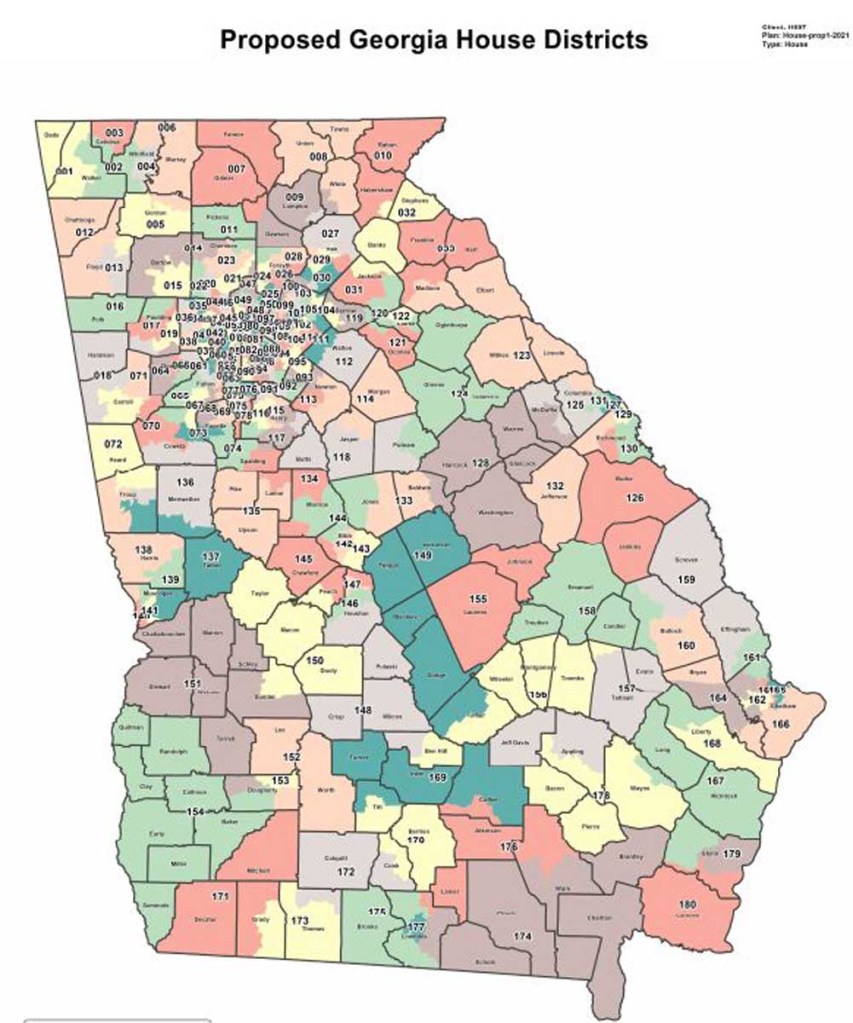SCOTUS ruling against Alabama’s racially redistricted map could affect Georgia
Published 5:08 pm Monday, June 12, 2023

- New Georgia House district map approved in November 2021
ATLANTA — The U.S. Supreme Court’s June 8 ruling that the state of Alabama’s new congressional map is unfair to Black voters could have an affect on new district maps in Georgia.
Shortly after the the Supreme Court’s ruling, Georgia Federal Court Judge Steve Jones order that parties in the Georgia State Conference of the NAACP v. Georgia case file a brief to address the Alabama decision and how it relates to the Georgia case.
The plaintiffs in the Georgia case argue that the new state House, Senate and congressional maps adopted by state lawmakers in 2021 are racial gerrymandered and violate Section 2 of the Voting Rights Act. The case is one of five pending lawsuits in Georgia challenging either/and the State House, State Senate and congressional districts.
Opponents of Georgia’s new maps have argued that the maps continue to give Republicans an advantage, though the state’s population grew 10% — by 1 million people — since 2010 and all of it in minority populations, which typically vote Democrat.
The Supreme Court’s 5-4 decision in the Alabama case (Allen v. Milligan) affirmed Milligan’s argument that Alabama’s congressional maps violate the Voting Rights Act by not adding an additional majority-Black district to accommodate the state’s population growth.
In part, the VRA states that the right of U.S. citizens to vote shall not be denied or abridged… on “account of race, color, or previous condition of servitude.”
The Court’s decision agreed with a previous ruling of a lower district court in Alabama indicating that despite the state’s population growth, the congressional map (House Bill 1) approved by the Republican-led legislature in 2021 was largely similar to the map a decade prior.
Currently, only one of the Alabama’s seven congressional districts is majority-Black, despite 2020 data revealing a nearly 27% Black population in the state, prompting lawsuits alleging racial gerrymandering and VRA violations.
Since 2010, U.S. Census data shows that the state’s Black alone population grew 3.6% in 10 years, while the white population decreased by -1.7%.
Fair Fight Action Executive Director Cianti Stewart-Reid said the Supreme Court ruling is a critical win for Black voters in Alabama and across the country where cases challenging racial gerrymandering are ongoing.
Democracy Docket reports that there are currently 30 ongoing redistricting lawsuits in 10 states that stand to be impacted.
“…Ten years ago, the Supreme Court voted down preclearance in Shelby v. Holder, a vital provision in Section 2 of the Voting Rights Act that would have prevented voters in Alabama from voting under gerrymandered maps in last year’s midterm election,” Stewart-Reid said. “Today, we celebrate this as a win for voters of color and tomorrow, we will continue the fight to ensure that voters everywhere are protected and have free and fair access to the ballot box.”
In another Georgia redistrict case filed in Dec. 2021, the American Civil Liberties Union, ACLU of Georgia and WilmerHale filed a federal lawsuit on behalf of Alpha Phi Alpha Fraternity, the Sixth District of the African Methodist Episcopal Church and an individual Georgia voter.
The suit indicates that State Senate and State House maps dilute the voting strength of Black Georgians because “they fail to include more than a half-dozen additional districts where Black voters could form a majority and have the opportunity to elect candidates of their choice.”
ACLU representatives argue that legislators could have drawn at least half a dozen Black-majority Senate or House districts in southern and eastern parts of the Atlanta metro region, the Augusta area and the Southwest Georgia area — areas that saw a large increase in minority populations since the last redistricting cycle in 2011.
In part, the lawsuit specifically references Senate Districts 16, 17 and 23, stating that lawmakers untracked Black populations and combined them into predominately white areas.
“Given that the Georgia cases rest on similar principles to those decided in Alabama, we are hopeful that the court will fairly apply the law to the facts and order new maps which better reflect the minority communities in Georgia,” Ken Lawler, chair of Fair Districts GA, said.
Added Kendra Cotton, CEO of New Georgia Project: “Today’s Supreme Court ruling in Allen v. Milligan is a welcome surprise from an institution who, lately, has been more interested in eroding our rights than protecting them…The Supreme Court’s decision not only gives Black voters in Alabama more equal footing and representation as they go to the polls, but it also sets an important precedent for other southern states, including Georgia, that have voting rights cases currently pending in the courts.”





